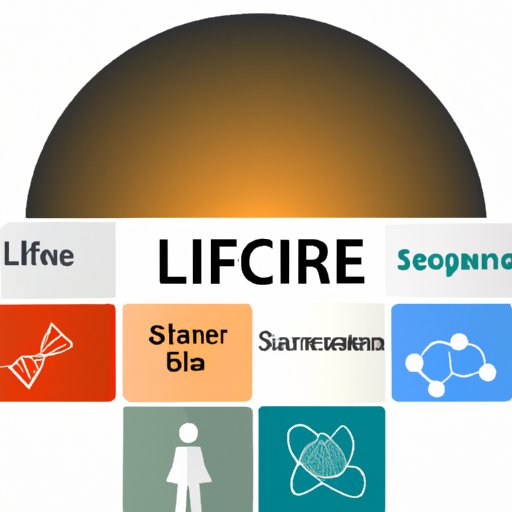Introduction
Life science is a broad field of study which encompasses disciplines such as biology, chemistry, and physics. It is focused on understanding life in all its forms, from single-celled organisms to complex ecosystems. By studying life science, we can gain insight into how living systems operate, how they interact with one another, and how they evolve over time. This article provides an overview of life science and its various types, applications, and career opportunities.
What is Life Science?
Life science is the study of living organisms and their environment. It is a broad field that encompasses many different disciplines, such as biology, chemistry, and physics. The term “life science” was first used in the early 19th century by German biologist Ernst Haeckel, who defined it as “the science of organic life” (Haeckel, 1866).
At its core, life science seeks to understand how living systems work, how they interact with each other, and how they evolve over time. To do this, life scientists use a variety of tools, such as microscopes and DNA sequencing technology, to observe, analyze, and interpret data about living organisms. As a result, life science has become increasingly important for understanding the complexities of biological processes, including human health, disease, and the environment.
A Comprehensive Guide to Life Science
Life science is a vast field of study, and there are many different types, applications, and career opportunities available. Below is a comprehensive guide to life science and its various aspects.
Types of Life Science
Life science is divided into two main branches: applied life science and basic life science. Applied life science focuses on applying scientific knowledge to solve real-world problems, while basic life science focuses on increasing our understanding of living organisms and their environment. Both branches are essential for advancing our knowledge and improving our quality of life.
Within these two branches, there are many subdisciplines. These include biochemistry, ecology, genetics, microbiology, molecular biology, physiology, and zoology. Each of these fields has its own unique set of tools and techniques for studying living organisms and their environment.
Areas of Study in Life Science
Life science covers a wide range of topics, from the structure and function of cells to the behavior of entire ecosystems. Common areas of study include evolution, genetics, immunology, neuroscience, and plant biology. In addition, life science also includes the study of human health and disease, as well as the effects of environmental factors on living organisms.
Career Opportunities in Life Science
Life science offers numerous career opportunities for those interested in pursuing a career in the field. Common job titles include laboratory technician, research scientist, professor, and medical doctor. Additionally, there are many specialized roles within life science, such as epidemiologist, genetic counselor, and biotechnologist.
Those interested in a career in life science should consider pursuing a degree in the field. Many universities offer undergraduate and graduate degrees in life science, and some even offer doctoral programs. Additionally, there are many professional organizations dedicated to life science, such as the American Society for Biochemistry and Molecular Biology, the Genetics Society of America, and the Society for Neuroscience.
Conclusion
Life science is a broad field of study which encompasses disciplines such as biology, chemistry, and physics. It is focused on understanding life in all its forms, from single-celled organisms to complex ecosystems. There are many types, applications, and career opportunities available within life science, making it an attractive field for those interested in pursuing a career in the field. This article provided an overview of life science and its various aspects.
In summary, life science is a field of study which seeks to understand how living systems work, how they interact with each other, and how they evolve over time. It employs a variety of tools and techniques to study living organisms and their environment, and there are many types, applications, and career opportunities available. Those interested in a career in life science should consider pursuing a degree in the field, as well as exploring the various professional organizations dedicated to life science.
(Note: Is this article not meeting your expectations? Do you have knowledge or insights to share? Unlock new opportunities and expand your reach by joining our authors team. Click Registration to join us and share your expertise with our readers.)
